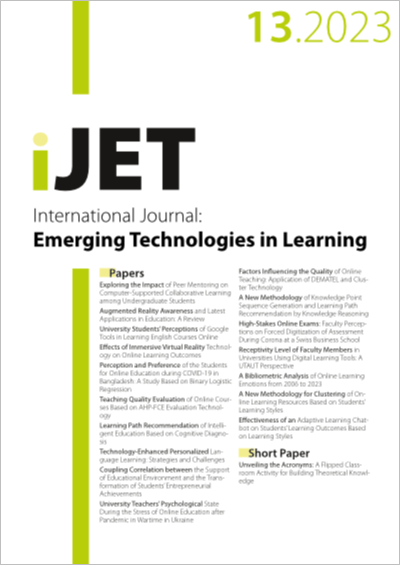Effectiveness of an Adaptive Learning Chatbot on Students’ Learning Outcomes Based on Learning Styles
DOI:
https://doi.org/10.3991/ijet.v18i13.39329Keywords:
E-learning, Conversational Agent, Recommendation, Personalization, Learning Object Recommendation, Learning Style, Chatbot, MoodleAbstract
Intelligent learning systems provide relevant learning materials to students based on their individual pedagogical needs and preferences. However, providing personalized learning objects based on learners’ preferences, such as learning styles which are particularly important for the recommendation of learning objects, re-mains a challenge. Recommending the most appropriate learning objects for learners has always been a challenge in the field of e-learning. This challenge has driven educators and researchers to implement new ideas to help learners improve their learning experience and knowledge. New solutions use artificial intelligence (AI) techniques such as machine learning (ML) and natural language processing (NLP). In this paper, we propose and develop a new personalization approach for recommendation that implements the adaptation of learning objects according to the learners’ learning style mainly focused on the use of a chatbot, named LearningPartnerBot, which will be integrated into the Moodle platform. We use the Felder-Silverman Learning Styles Model to determine learners’ learning styles in order to recommend learning objects, and also to overcome the cold start problem. A chatbot is an automated communication tool that attempts to imitate a conversation by detecting the intentions of its user. The proposed LearningPartnerBot should be able to answer learners’ questions in real time and provide a relevant set of suggestions according to their needs.
Downloads
Published
How to Cite
Issue
Section
License
Copyright (c) 2023 Wijdane KAISS, Khalifa Mansouri, Franck Poirier

This work is licensed under a Creative Commons Attribution 4.0 International License.



